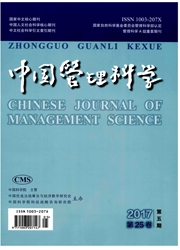

 中文摘要:
中文摘要:
传统代理人激励模型建立在参与人自利性假设基础之上,本文引入“不公厌恶”和“风险厌恶”因素,由浅入深地研究激励因素、风险厌恶和不公厌恶三者对经理人最优持股契约的影响。发现经理人的风险厌恶倾向导致其减低持股比例,激励因素倾向于使经理人增加持股比例,而不公厌恶使得经理人持股比例在1/2左右。当经理人努力是不可缔约的且经理人是不公厌恶和风险厌恶时,为激励经理人进行智力投资,必须赋予其一定比例的股权,使委托人与代理人利益趋于一致,以降低由经理人不公厌恶产生的效用损失,进而降低委托代理成本。
 英文摘要:
英文摘要:
All traditional principal agent models are ground on absolute selfish agent. In this paper intro duces inequity aversion and risk aversion factor on the basis of principal - agent theory to study how motivators, risk aversion as well as inequity aversion effects manager stock option incentive. The result reveals, risk aversion tendency leads management to reduce the proportion of shares acquired, motivators lead them to add share proportion of shareholding and equity preference makes their shareholding ratio about 1/2. When the managers are not contracted and they are risk aversion and inequity aversion managers, in order to encourage managers' investment, shareholders must give the proportion of equity to them to balance the profits between managers and shareholders. It can reduce the cost of inequity averse, thereby reducing the principal-agent cost.
 同期刊论文项目
同期刊论文项目
 同项目期刊论文
同项目期刊论文
 期刊信息
期刊信息
